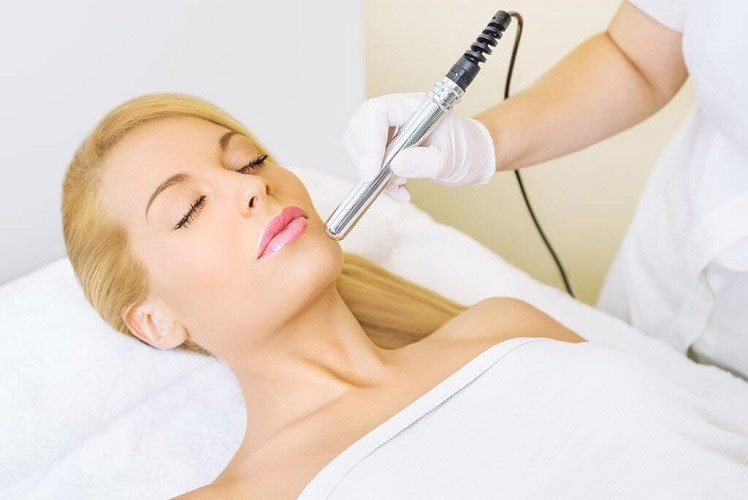Dark spots on the face are a common concern, affecting millions of people worldwide. These spots can be caused by various factors, including sun damage, aging, hormonal changes, and even genetics. While they’re typically harmless, they can be a bothersome cosmetic issue.
Fortunately, laser treatment has emerged as a highly effective method for reducing or eliminating dark spots. This article will delve into everything you need to know about laser treatment for dark spots on the face, including its benefits, the different types of lasers used, what to expect during and after treatment, and potential risks and side effects.

Understanding Dark Spots and Hyperpigmentation
Before diving into laser treatment, let’s understand the science behind dark spots. These spots, also known as hyperpigmentation, occur when melanin production in the skin increases in localized areas. Melanin is the pigment that gives skin its color, and excess production can lead to uneven skin tone and the appearance of dark spots.
Benefits of Laser Treatment for Dark Spots
Laser treatment offers several advantages over other methods for addressing dark spots:
- Effectiveness: Laser treatments are highly effective in reducing the appearance of dark spots, often achieving significant improvement in just a few sessions.
- Precision: Lasers can target specific areas of hyperpigmentation without affecting surrounding healthy skin.
- Minimal downtime: Compared to other procedures like dermabrasion, laser treatments typically have minimal downtime, allowing you to resume your daily activities quickly.
- Long-lasting results: While some sun exposure can cause dark spots to return, laser treatment results can be long-lasting, especially with proper sun protection.
- Promotes smoother skin: Certain laser treatments can also improve skin texture and reduce wrinkles alongside addressing dark spots.
Types of Lasers Used for Dark Spots
Several types of lasers are used for treating dark spots, each with its strengths and applications. Here’s a breakdown of the most common ones:
- Intense Pulsed Light (IPL): IPL therapy is a broad-spectrum light treatment that targets various skin concerns, including dark spots. It’s a gentler option suitable for lighter skin tones.
- Q-Switched lasers: These lasers deliver high-powered pulses of light to shatter pigment clusters, effectively treating darker spots and freckles.
- Alexandrite lasers: These lasers emit a specific wavelength of light well-absorbed by melanin, making them ideal for targeting brown spots and sun damage.
- Fractional CO2 lasers: This advanced laser technology delivers microscopic beams of light that penetrate deep into the skin, stimulating collagen production and reducing hyperpigmentation. It’s a powerful option for addressing deeper wrinkles and sun damage along with dark spots.
What to Expect During Laser Treatment
A consultation with a board-certified dermatologist is crucial before undergoing laser treatment. They will assess your skin type, the severity of your dark spots, and your overall health to determine the most suitable laser and treatment plan.
The laser treatment itself is typically an outpatient procedure performed in a dermatologist’s office. Depending on the laser used and the size of the treatment area, a session can last anywhere from 15 minutes to an hour.
During the treatment, you might experience a snapping or prickling sensation. Topical numbing cream can be applied to minimize discomfort. You might also wear protective eyewear to shield your eyes from the laser light.
What to Expect After Laser Treatment
Following laser treatment, your skin may experience some redness, swelling, and mild scabbing. These effects are usually temporary and resolve within a few days to a week. Here are some aftercare tips to promote optimal healing:
- Meticulous sun protection: Sun exposure can worsen hyperpigmentation. Use a broad-spectrum sunscreen with SPF 30 or higher daily, and reapply every two hours when outdoors.
- Moisturize regularly: Keep your skin well-hydrated to aid healing and prevent dryness.
- Avoid picking or scratching: Let any scabs form naturally and fall off on their own to prevent scarring.
- Minimize makeup use: Avoid applying makeup to the treated area for at least 24 hours after treatment.
Risks and Side Effects of Laser Treatment
While laser treatment is generally safe, potential side effects can occur. These include:
- Temporary redness, swelling, and crusting: As mentioned earlier, these are common and typically resolve within a few days.
- Scarring: This is a rare complication but can occur if the laser treatment is too aggressive or if the skin doesn’t heal properly.
- Hypopigmentation: In some cases, laser treatment can lighten the treated area more than intended, leading to lighter patches of skin. This is more likely in people with darker skin tones.
Finding the Best Laser Treatment for Dark Spots: Expert Tips in 2024
Choosing the right laser treatment for your dark spots requires careful consideration. Here are some expert tips to guide you:
Consultation is Key:
- Board-certified dermatologist: Seek a board-certified dermatologist experienced in laser treatments for optimal results and to minimize risks.
- Skin evaluation: During the consultation, the dermatologist will evaluate your skin type, the nature and depth of your dark spots, and your medical history. This helps them determine the most suitable laser and treatment plan.
- Realistic expectations: Discuss your desired outcome and understand that multiple sessions might be necessary for optimal results. It’s also important to know that laser treatment can significantly reduce dark spots, but it might not eliminate them.
Considering Your Skin Tone:
- Laser selection: The type of laser chosen will depend on your skin tone. For instance, IPL is generally gentler and better suited for lighter skin tones, while Q-switched lasers are more effective for darker spots and freckles.
- Risk of hypopigmentation: People with darker skin tones have a higher risk of hypopigmentation, a lightening of the treated area. Your dermatologist will consider this risk factor when recommending a laser.
Cost Considerations:
- Pricing varies: The cost of laser treatment for dark spots can vary depending on the type of laser used, the number of sessions required, the dermatologist’s expertise, and your geographic location.
- Consultation fees: Factor in consultation fees when budgeting for treatment.
- Insurance coverage: Laser treatment for dark spots is typically considered cosmetic and may not be covered by insurance. However, it’s always worth checking with your insurance provider to be sure.
Beyond Laser Treatment: Alternative Options
While laser treatment is a powerful tool, it’s not the only option for addressing dark spots. Here are some alternative approaches you might consider, especially if you have concerns about laser treatment:
- Topical creams: Certain creams containing ingredients like hydroquinone, kojic acid, and retinoids can lighten dark spots with consistent use. However, results may take longer to achieve compared to laser treatment.
- Chemical peels: Chemical peels involve applying a solution to the skin to remove the outer layer, promoting new cell growth and potentially reducing the appearance of dark spots. The strength of the peel will determine its effectiveness for dark spots.
Final Verdict
Laser treatment remains one of the most effective methods for reducing or eliminating dark spots on the face. With careful selection of a qualified dermatologist and the right type of laser, you can achieve significant improvement in your skin tone and regain your confidence. Remember, proper sun protection is essential to maintain results and prevent future hyperpigmentation.
Additional Tips for Success
- Maintain a healthy lifestyle: A balanced diet rich in antioxidants and staying hydrated can contribute to overall skin health and potentially aid in reducing hyperpigmentation.
- Manage stress: Chronic stress can exacerbate skin problems, including dark spots. Consider stress-management techniques like yoga or meditation to promote skin health.
- Seek professional advice: Don’t hesitate to consult a dermatologist if you have any concerns about dark spots or other skin issues. Early diagnosis and treatment can often lead to better outcomes.
By following these tips and consulting with a qualified dermatologist, you can achieve a clearer, more even skin tone and address those bothersome dark spots effectively.
